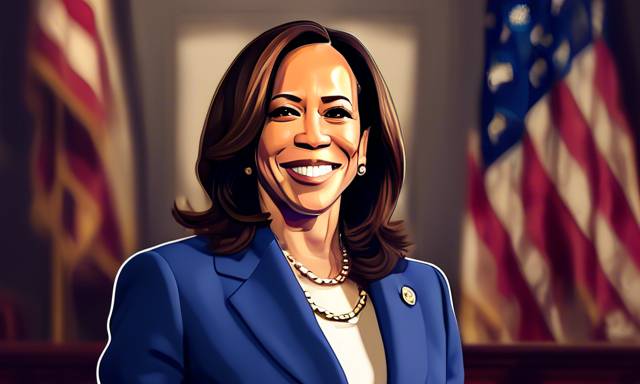Imagine you’re at a coffee shop, sitting across from a buddy who’s been hearing about cryptocurrency but isn’t really sure what all the fuss is about. You take a sip of your espresso and say, “Dude, have you followed the latest on Kamala Harris and how she’s talking about crypto? Like, it’s wild how politicians are finally starting to notice us! Let’s break it down.”
KEY TAKEAWAYS
- Harris scored a "B" rating from a crypto advocacy group, stirring mixed reactions.
- Her comments about crypto were a breakthrough moment in the political landscape.
- Former President Trump currently holds a higher "A" rating, showing a political divide.
- The overall sentiment in the crypto community is skeptical, but there’s cautious optimism about more political engagement.
So, here’s the scoop: Over the weekend, Vice President Kamala Harris spoke at a fundraiser in New York, mentioning her aim to support “innovative technologies like AI and digital assets” while also vowing to protect consumers and investors. Now, this might seem like just another political speak, but it’s actually a big deal. Harris got a "B" rating from Stand With Crypto, a group that advocates for the industry, marking her first major mention of crypto on the campaign trail.
Now, I know what you’re thinking. "A ‘B’ rating? So what?" Well, that’s sparked a lot of chatter. While some in the crypto space are excited, there were plenty of skeptics on social media. For example, NFT collector Cozomo de’ Medici was all like, “Delete this!” in response. It’s pretty clear that the crypto community feels divided about this, especially since Trump is out there claiming the crypto crown with an “A” rating.
This all happens as we face the reality of the approaching presidential elections. Harris is facing a tight race against Trump, and with crypto advocates rallying in key battleground states like Arizona, Michigan, and Wisconsin, it seems both candidates are trying to woo a demographic that’s becoming impossible to ignore.
It’s worth noting, though, that some industry insiders are pointing out that talk doesn’t always translate to action. Matthew Sigel from VanEck made a solid point saying it’s tough to take Harris seriously when the Biden administration has been seen as cracking down hard on the crypto market lately. High-profile enforcement actions against firms like Coinbase have some feeling that the administration’s words and actions don’t line up.
So, as an investor, what does this means for you? Here are some practical tips:
-
Stay Informed: Keep an eye on political candidates and their stances on crypto. This isn’t just a fad; it can genuinely impact market sentiment and policy.
-
Don’t Follow the Herd: Just because the sentiment is divided doesn’t mean you should jump ship. Look at fundamentals and how political moves can shape the market in the long haul.
-
Engage with the Community: Get involved in discussions online. Platforms like Twitter and even Discord channels can keep you tapped into the latest sentiments and news.
-
Invest with Caution: Understand how political climates affect your investments. No one can predict the market perfectly, but knowing what drives policy can help you make smarter decisions.
- Diversify Your Portfolio: With all this political talk, it’s a good time to think about diversifying beyond just Bitcoin or Ethereum. Explore other altcoins that may benefit from favorable legislation or that align with the future tech Harris mentioned like AI.
Reflecting on this whole situation, it’s amazing to see politicians finally acknowledging the impact of crypto. I mean, a few years back, no one would have dared to mention it on stage, let alone make it a part of campaign promises. What if the conversation around crypto changes how we see governmental regulation in the future? Will we look back on this moment as the catalyst for a new era in finance? 🌍💸
If you’re curious about the dynamic between politics and crypto, or if you just want to learn more, take a dive into the rabbit hole of crypto news and engage with this evolving narrative. It’s a wild ride, and I think we’re just scratching the surface.
For more insights, you might also be interested in:
What do you think? Is political engagement a boon for crypto, or just a distraction from the real issues? 🤔





 By
By
 By
By
 By
By
 By
By

 By
By